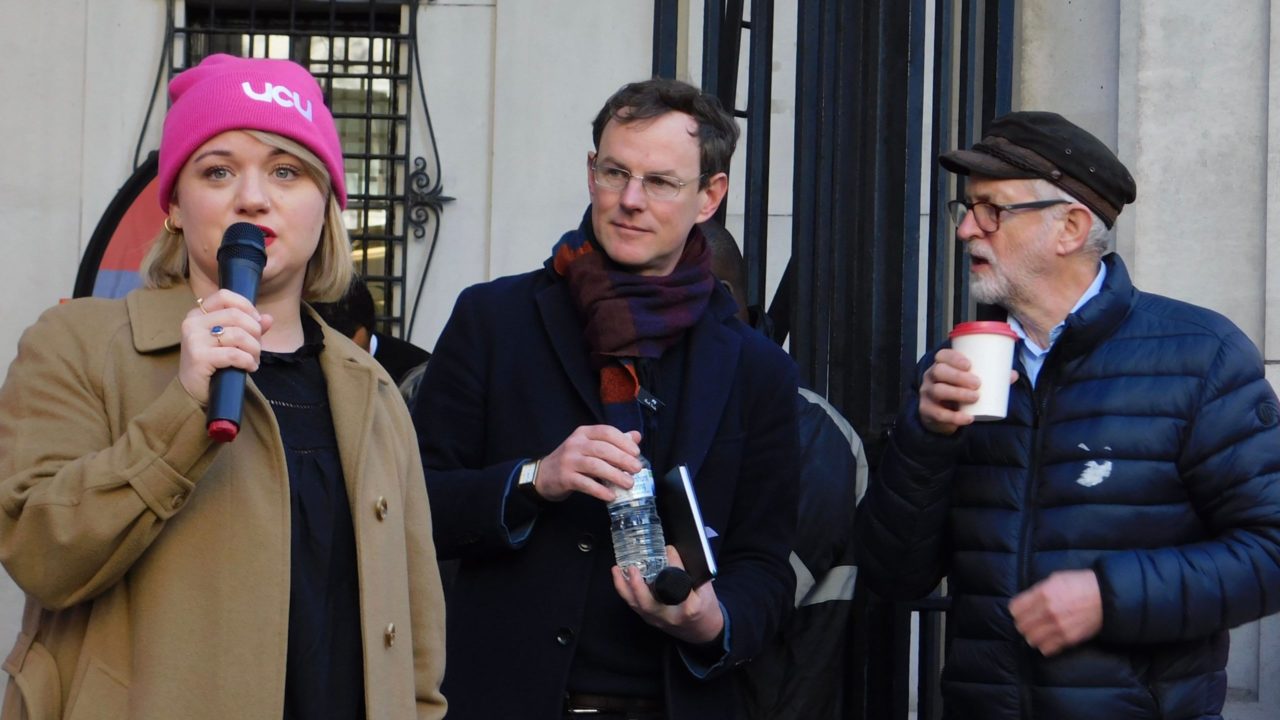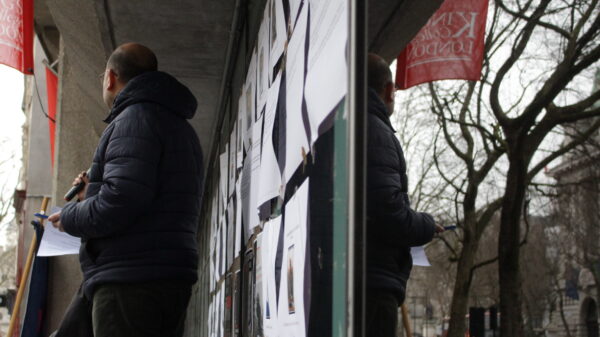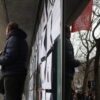News Editor Violeta Fernandez Dieguez interviews professors and students at the Strand picket line, march on Westminster and around campus to gather perspectives on the ongoing University and College Union (UCU) strikes at King’s.
While strikes are nothing new to the university experience, this scale of action is unprecedented. The UCU scheduled 18 days of strikes in February and March as tensions with universities rise.
Why 18 days of strike action now?
The increase in strike action has to do with the rise in inflation. As a London School of Economics (LSE) Lecturer explained to Roar, “Our salaries stagnate and stagnate as inflation goes up and up and up”. This is an issue that is not exclusive to higher education; it affects workers everywhere.
As Sean Wallis, the UCU President for University College London (UCL) stated in his speech at Whitehall, “Inflation is a transfer of wealth from every working class [person] to the super-rich”.
Inflation in the UK has been hovering at around 10% but salaries have not kept up. This is a sentiment shared by many professions from school teachers, to nurses to firefighters and more. Rishi Sunak’s proposed anti-strike bill was also an issue of contention, as this law would enforce minimum service levels and thus limit industrial action.
Within King’s, the issue is the same. Lecturers across fields agree that pay has not matched inflation, working conditions are poor and junior teaching staff face precarity and instability. All of this affects students, of course. On the picket line, banners and slogans read “teacher’s working conditions are student’s learning conditions”.

credit: Elizabeth Grace
What is meant by poor working conditions?
For university teaching staff, poor working conditions come in the form of an unmanageable work load. The aforementioned LSE lecturer commented, ‘There should be more of us [teaching staff]. We’re so over-worked, and every year more over-worked’.
For the early-career teaching staff, the situations is even more dire. Dr Jean Lagacé, a King’s lecturer in Pure Mathematics, talked about how junior lecturers face a lot of instability, especially early in their career. Some have six month or zero-hour contracts: “They don’t know at the beginning of the term if the next term they will teach again, if they will be paid again. It’s not the type of conditions in which we can do a good job for the students”.
Lagacé continued, “If we spend more time being stressed [about] how can I put a roof over my head on the next term, how can I dedicate my energy to providing (…) good teaching [and] learning conditions for my students, because I’m not myself in a good condition”. Further, he made the point that striking is “to the benefit of the whole university community”.
He asked, “Do you benefit more from a class where you’re twenty or forty or eighty or three-hundred in that class? Do you benefit more from being taught by people who can dedicate their time to do the teaching? Do you benefit more from having conditions that are appropriate for learning and class sizes that make sense?”
Ewen McGaughey, President of KCL UCU and lecturer in the Dickson Poon School of Law, also raised this issue of precarity: “[Striking is] about making sure that our younger colleagues don’t face continued pay cuts, we’ve had over 25% pay cuts in real terms since 2010. So, a starting lecturer will earn abo £10,000 less nowadays than [more senior lecturers] used to.”
This decline in the quality of teaching is felt by the student body. Olivia Campbell, law student and President of Liberate KCL, says that she feels “the quality of education that we’re receiving is poor, and that’s a crisis”.
Another big issue: pension cuts
What many teaching staff are also worried about is a cut in their pensions. McGaughey commented that “[There have been] huge pension cuts for everybody. I think that’s unfair, everyone should retire securely at old age”. The LSE lecturer also talked about his personal experience: “My future pension is cut by probably 40%. The pension system is in perfectly fine health but the pension cuts are being maintained. LSE officially supports that, King’s officially supports that.”
Dr James Scott, a lecturer in International Politics at King’s, is also worried: “What they’ve done on pensions is nothing short of scandalous. They are trying to get rid of the pension fund or at the very least greatly reduce their contributions.”
The gender and race pay gap
Another much talked-about issue is gender and race pay gaps. These are 17% and 20%, respectively, at King’s. A more detailed description on these pay gaps can be found on the KCL UCU website. Olivia Campbell commented on the pay gap issue: “What people fail to understand is that when we allow these race and gender pay gaps to perpetuate (…), when [the money from student’s tuition fees] is not being properly spent, our learning takes a hit.”
Fighting for democracy at King’s
Lastly, a topic of contention at the strikes was the College Council. McGaughey explained:
“We have to do something to make sure our university is democratic. We have a Council at King’s College London, the governing body that appoints management and sets paying conditions, where the people in that body appoint their own successors. We’ve only got four people that are [democratically] elected out of about twenty. That’s not good enough, we should have majority elected governing body, not one that appoints itself. So, the reason that I’m on strike today is to try make our university a better place for all students and staff.”
Furthermore, McGaughey states, “We’ve got managements of universities around the country sitting on piles of cash. In the KCL council this year the operating surplus is £42 million. There is roughly a £1.1 billion turnover at King’s and this is the same with incredibly wealthy institutions around the country, and that money comes from extorsion of tuition fees. For home students the fees have tripled since 2010, for international students […] they’ve doubled. […] But that money is not going into teaching, we’ve gotten a broken, failed model of privatising education. The strikes are about trying to change universities for the better”.
Who bears the burden of the strikes? Students.
While these issues are of the utmost importance, strike action has regardless a huge effect on learning conditions. The LSE lecturer admitted, “[The strikes are] really shitty for you, and we’re sorry that that [it] is [like this]. The only bargaining power the train drivers have is to stop driving the trains […], all that we have left is to not teach our students”.
Students feel this effect. A 3rd year European Studies student told Roar, “It’s a good cause to support, but the amount of days that they are striking is kind of enormous. I feel I’m less supportive [of the strike] because of that, it’s going to affect my education”. He added, “Maybe a third of my classes [are affected]. So I’m kind of bored by the strikes now”.
Other students are more supportive of the strikes, a 2nd Year Politics student hanging around the picket line commented, “[It’s important to not cross the picket line] to show your support, even with the [professors] who can’t strikes”. She also shared that “[even with the strikes], we’re getting alternative education”, referring to the make-shift lectures delivered on the picket line, the topics of these ranging from trade union power to war and imperialism.
Still, not all lecturers have decided to strike. A King’s lecturer shared with Roar that he chooses not to strike because “[he] can’t get [himself] to ruin students’ learning experiences” given the high tuition fees and the fact that international students have travelled abroad for their education. He also comments that he is doubtful of the “effectiveness of […] indutrial action” and whether it actually leads to “a real improvement in our working conditions”. Nevertheless, he “very much share[s] the motivations of the strike”.
Dr Lagacé thinks that professors choosing to not strike is “sad”, especially in the case of the more senior professors “who have made it and who don’t support their younger colleagues”. He explains that “[not striking is] a bit sad and a bit short-sighted as well because if we do nothing to change the material conditions now, it does affect the students more”. On this, Dr Scott states that, at the end of the day, “everyone has got to make their own decision. We understand that some people, for reasonable reasons, choose not to [strike]”.
Lastly, McGaughey announced that there may be more strike action:
“There is going to be a re-ballot nationally for all strike action that could potentially disrupt marking and assessments so that students don’t graduate. […] The reason that it’s escalating and that we’ve gotten eighteen days of strike action in February and March now, is because the employers are refusing to negotiate in good faith.”
McGaughey feels grateful that “[they’ve] had incredible support from students everywhere”. He states, “The more we get the message out that tuition fees are going up but pay is going down, the more people understand that it’s got to change”. Olivia Campbell finishes off by reiterating a commonly used Union slogan:
“The bigger the picket, the shorter the strike.”
Since the onset of strike action earlier this year, KCL has said “we are taking steps to address the important issues which are of concern to our students and staff and colleagues across the sector”.















